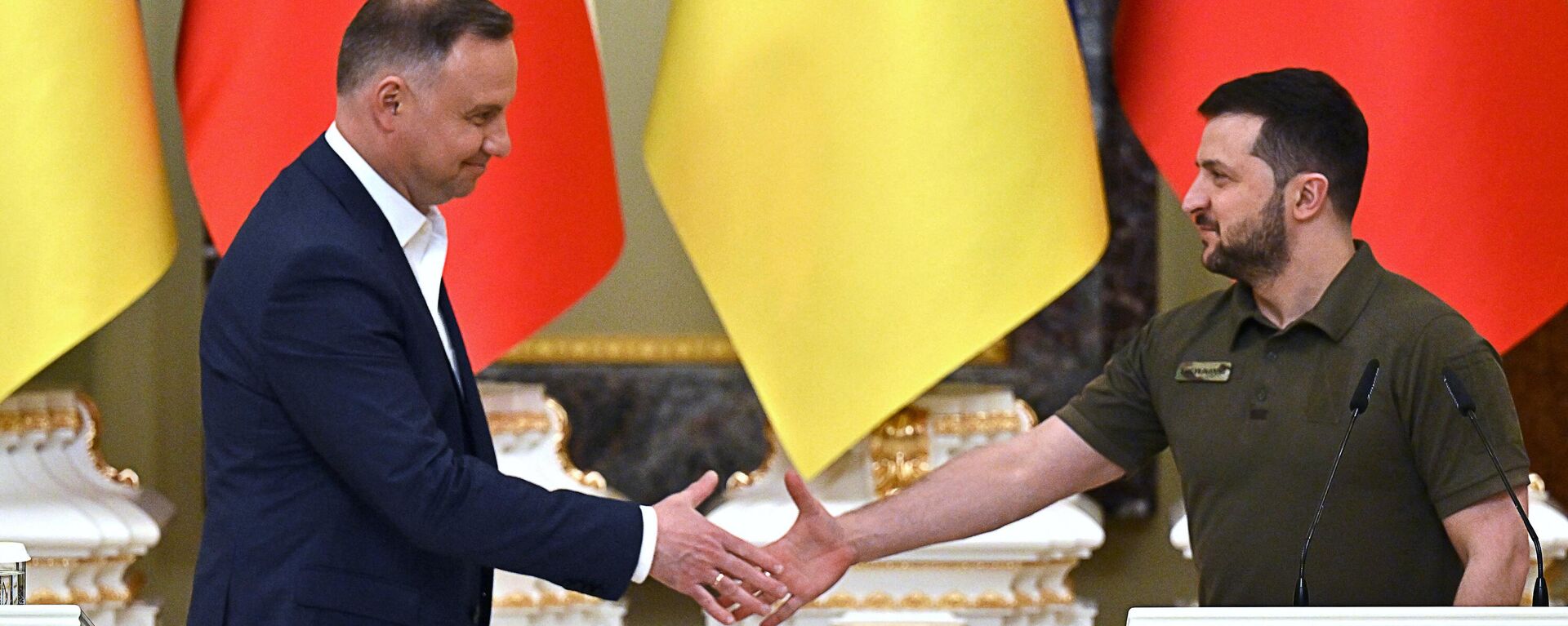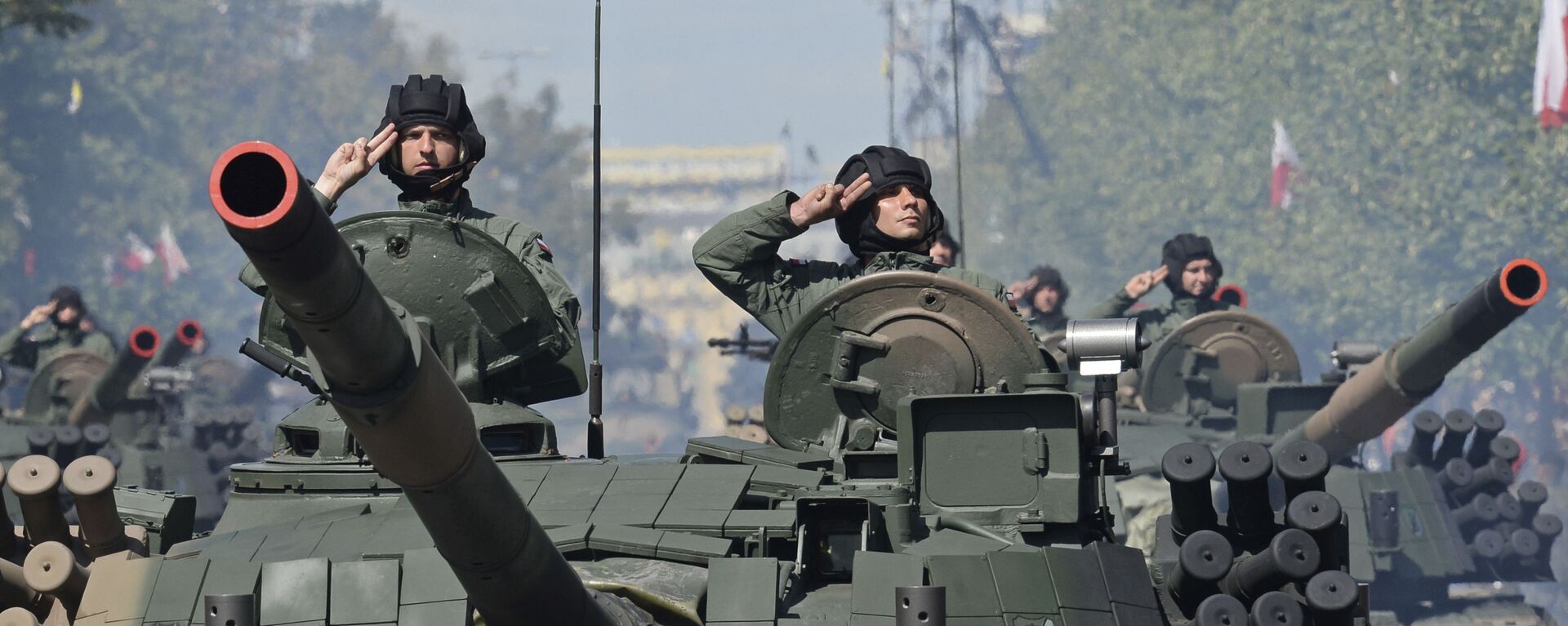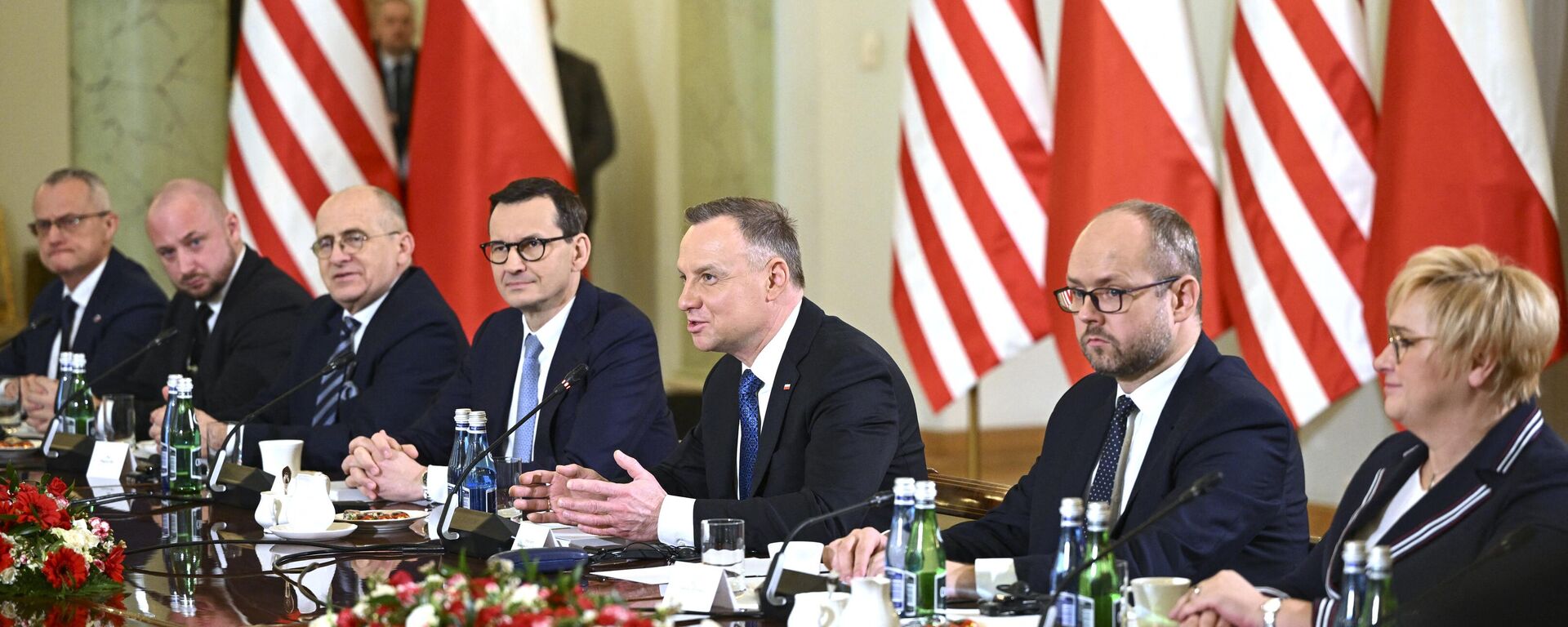https://sputnikglobe.com/20230920/polish-ukrainian-spat-threatens-to-strip-zelensky-of-one-of-his-closest-nato-allies-1113536381.html
Polish-Ukrainian Spat Threatens to Strip Zelensky of One of His Closest NATO Allies
Polish-Ukrainian Spat Threatens to Strip Zelensky of One of His Closest NATO Allies
Sputnik International
Polish President Andrzej Duda dramatically shelved plans to meet with his Ukrainian counterpart Volodymyr Zelensky on Tuesday amid the quickly escalating trade dispute between the two countries. Sputnik turned to renowned geopolitical analyst Paolo Raffone for insights on some of the behind-the-scenes reasons for the spat.
2023-09-20T17:59+0000
2023-09-20T17:59+0000
2023-09-20T18:18+0000
analysis
volodymyr zelensky
andrzej duda
mateusz morawiecki
poland
ukraine
kiev
european union (eu)
foreign ministry
nato
https://cdn1.img.sputnikglobe.com/img/07e7/09/14/1113535880_0:0:3072:1728_1920x0_80_0_0_4f362e0585b3b645a6e7eba69b9c4aa7.jpg
The trade row between Kiev and Warsaw crossed the Rubicon into the political realm this week, with Poland’s Foreign Ministry summoning Ukraine’s ambassador Wednesday afternoon over Zelensky’s comments at the General Assembly on Tuesday alleging that “some EU countries feigned solidarity” with Kiev “while indirectly supporting Russia.”On Tuesday, defending Warsaw’s decision to impose import restrictions on Ukrainian foodstuffs, Poland’s president compared Zelensky’s Ukraine to an "incredibly dangerous" "drowning man" who threatens to "drag" others, including Poland, down "into the depths."“Of course we must act to protect ourselves from a drowning man causing us harm, because if the drowning man causes us harm and drowns us, he won’t get any help. So we have to look after our own interests, and we will do this effectively and decisively,” President Duda told reporters in New York.What’s the Problem?The diplomatic spat between Poland and Ukraine began to take shape last Friday, when the European Commission announced that it would not extend restrictions on Ukrainian agricultural exports into the EU, effective immediately, which prompted Poland, Hungary, and Slovakia to slap unilateral restrictions on Ukrainian foodstuffs in a bid to protect local farmers.Polish Minister of Agriculture Robert Telus called Kiev’s actions “a big surprise,” and emphasized that while Poland would be sure to survive the hit taken from Ukraine’s agricultural embargo, “it’s unknown whether Ukraine will be able to cope.”Separately on Tuesday, Polish government Press Secretary Piotr Muller announced that Warsaw has no plans to continue providing assistance to the up to one million Ukrainian refugees living in the country in the new year. “I think these rules will not be extended to any significant extent. We now know more about this conflict, including the lines of dispute and the possibilities of international assistance. The entire international community needs to be more involved,” Muller said.Other Polish politicians have called for a harder line, with lawmaker Krzysztof Bosak recommending that Ukraine be billed for assistance already provided, presenting a figure of 101 billion zloty (about $23.4 billion US). Polish politician Slawomir Mentzen suggested Warsaw should stop allowing weapons and military equipment to be delivered to Ukraine through Polish territory. “Ukraine is probably doing too well in their war with Russia if they want to start a trade war with Poland right now,” Mentzen said.Old Dispute and Poland’s ‘Imperial’ AmbitionsThe trade dispute is just the latest manifestation of growing tensions between Warsaw and Kiev, stemming from frustrations among many Poles over refugees, the economic downturn in Poland caused by the Ukraine crisis, unresolved historical issues related to the Ukrainian government’s glorification of WWII-era Ukrainian fascists who murdered up to 100,000 Polish civilians, and dissatisfaction over Ukraine's failing counteroffensive.“Poland’s engagement with Ukraine is coherent with the national Polish misperception of its own geopolitical role,” Paolo Raffone, director of the CIPI Foundation, a Brussels-based geopolitical affairs think tank, told Sputnik.‘Peasants Vote Too’The scandal in Poland over cheap Ukrainian agricultural imports, which now threatens to unravel Polish geopolitical ambitions, makes sense amid the bitter, acrimony-filled political battles for power now underway in the country ahead of next year’s parliamentary elections, the observer noted.“In Poland there is a fight between competing nationalist political parties with [former Prime Minister Donald] Tusk’s Civic Alliance openly supported by NATO, the EU, and some sectors of the US apparatus. The [ruling] PiS leaders (in power and seven points ahead in polls) are openly playing a gamble with the support of the hawks in Washington and the UK. The country is heavily divided and, without a serious game changer, neither party will be able to reach a majority to govern. This situation explains the harsh rhetoric,” the observer noted.The Zelensky government will undoubtedly have reason to “worry” about any changes in Poland’s stance on the proxy war with Russia, Raffone believes, particularly in light of President Duda’s likening of Ukraine to a “dangerous drowning man” in Europe.
https://sputnikglobe.com/20230920/polands-duda-cancels-unga-meeting-with--zelensky-likens-ukraine-to-drowning-man-1113516031.html
https://sputnikglobe.com/20230811/what-is-polands-role-in-ukraine-and-could-warsaw-go-through-with-plans-to-invade-1112537045.html
https://sputnikglobe.com/20230910/polish-opposition-proposes-tribunal-against-president-pm-amid-bitter-election-battle-1113256065.html
poland
ukraine
kiev
Sputnik International
feedback@sputniknews.com
+74956456601
MIA „Rossiya Segodnya“
2023
News
en_EN
Sputnik International
feedback@sputniknews.com
+74956456601
MIA „Rossiya Segodnya“
Sputnik International
feedback@sputniknews.com
+74956456601
MIA „Rossiya Segodnya“
poland, ukraine, kiev, warsaw, dispute, spat, argument, wto, agriculture, imports, history, bad blood, andrzej duda, volodymyr zelensky, relations, ties, nato, united states, foodstuffs, grain, restrictions, unilateral
poland, ukraine, kiev, warsaw, dispute, spat, argument, wto, agriculture, imports, history, bad blood, andrzej duda, volodymyr zelensky, relations, ties, nato, united states, foodstuffs, grain, restrictions, unilateral
Polish-Ukrainian Spat Threatens to Strip Zelensky of One of His Closest NATO Allies
17:59 GMT 20.09.2023 (Updated: 18:18 GMT 20.09.2023) Polish President Andrzej Duda dramatically shelved plans to meet with his Ukrainian counterpart Volodymyr Zelensky on Tuesday amid the quickly escalating trade dispute between the two countries. Sputnik turned to renowned geopolitical analyst Paolo Raffone for insights on some of the behind-the-scenes reasons for the spat.
The trade row between Kiev and Warsaw crossed the Rubicon into the political realm this week, with Poland’s Foreign Ministry summoning Ukraine’s ambassador Wednesday afternoon over Zelensky’s comments at the General Assembly on Tuesday alleging that “some EU countries feigned solidarity” with Kiev “while indirectly supporting Russia.”
“Deputy Foreign Minister [Pawel] Jablonski voiced Poland’s expectation that both the policy pursued by Ukrainian authorities and their public communication will reflect the actual nature of Polish-Ukrainian relations, both current and historical, taking into account the unprecedented assistance provided by Poland and the Poles to the Ukrainian population and the Ukrainian state,” the Polish Foreign Ministry said in a press statement.
On Tuesday, defending Warsaw’s decision to impose import restrictions on Ukrainian foodstuffs, Poland’s president compared Zelensky’s Ukraine to an "incredibly dangerous" "drowning man" who threatens to "drag" others, including Poland, down "into the depths."
“Of course we must act to protect ourselves from a drowning man causing us harm, because if the drowning man causes us harm and drowns us, he won’t get any help. So we have to look after our own interests, and we will do this effectively and decisively,” President Duda told reporters in New York.
The diplomatic spat between Poland and Ukraine began to take shape last Friday, when the European Commission announced that it would not extend restrictions on Ukrainian agricultural exports into the EU, effective immediately, which prompted Poland, Hungary, and Slovakia to
slap unilateral restrictions on Ukrainian foodstuffs in a bid to protect local farmers.
Kiev responded by filing a complaint against the three countries with the World Trade Organization, and threatening to ban some Polish and Hungarian imports if the countries didn’t immediately lift their restrictions. Local media later learned that Polish onions, tomatoes, cabbage and apples were on the chopping block of Ukraine’s retaliatory measures.
Polish Minister of Agriculture Robert Telus called Kiev’s actions “a big surprise,” and emphasized that while Poland would be sure to survive the hit taken from Ukraine’s agricultural embargo, “it’s unknown whether Ukraine will be able to cope.”
Polish Prime Minister Mateusz Morawiecki warned Kiev of serious consequences if it continued to escalate the dispute. “I warn the Ukrainian authorities: if they escalate the conflict, we will add more products to the import ban.”
Separately on Tuesday, Polish government Press Secretary Piotr Muller announced that Warsaw has no plans to continue providing assistance to the up to one million Ukrainian refugees living in the country in the new year. “I think these rules will not be extended to any significant extent. We now know more about this conflict, including the lines of dispute and the possibilities of international assistance. The entire international community needs to be more involved,” Muller said.
Other Polish politicians have called for a harder line, with lawmaker Krzysztof Bosak
recommending that Ukraine be billed for assistance already provided, presenting a figure of 101 billion zloty (about $23.4 billion US). Polish politician Slawomir Mentzen suggested Warsaw should stop allowing weapons and military equipment to be delivered to Ukraine through Polish territory. “Ukraine is probably doing too well in their war with Russia if they want to start a trade war with Poland right now,” Mentzen
said.

20 September 2023, 08:39 GMT
Old Dispute and Poland’s ‘Imperial’ Ambitions
The trade dispute is just the latest manifestation of growing tensions between Warsaw and Kiev, stemming from
frustrations among many Poles over refugees, the economic downturn in Poland caused by the Ukraine crisis,
unresolved historical issues related to the Ukrainian government’s glorification of WWII-era Ukrainian fascists who murdered up to 100,000 Polish civilians, and
dissatisfaction over Ukraine's failing counteroffensive.
“Poland’s engagement with Ukraine is coherent with the national Polish misperception of its own geopolitical role,” Paolo Raffone, director of the CIPI Foundation, a Brussels-based geopolitical affairs think tank, told Sputnik.
“The conception of an ‘imperial Poland’ is not new, but despite the sequence of historical dramatic defeats, Polish leaders still perceive themselves as a great nation that should be recognized as an empire. The Polish imperial concept pivots on the country’s role in determining the interests of its neighbors. The ‘Trimarium’ (Baltic-Black-Adriatic Seas) vision places Poland at the center, a cornerstone of a geopolitics involving Ukraine, Lithuania, Hungary, and Croatia. In such a ‘strategic’ position, Poland ‘dreams’ to become the ‘power’ that in association with the US keeps Germany and Russia ‘out’” of much of Eastern Europe. “This misconception explains the heavy rearmament of Poland and its interested policy towards Ukraine,” Raffone explained.

11 August 2023, 16:18 GMT
The scandal in Poland over cheap Ukrainian agricultural imports, which now threatens to unravel Polish geopolitical ambitions, makes sense amid the
bitter, acrimony-filled political battles for power now underway in the country ahead of next year’s parliamentary elections, the observer noted.
“Peasants vote too, and in certain cases they can be a determinant,” Raffone stressed, saying that while the grain issue appears to be “political tactics” or theater on the surface, “it also hides a diffused popular discontent, particularly in Poland and Hungary, with the Ukrainian leadership and the influx of war refugees. Leaders, especially when facing elections, cannot ignore it.”

10 September 2023, 13:33 GMT
“In Poland there is a fight between competing nationalist political parties with [former Prime Minister Donald] Tusk’s Civic Alliance openly supported by NATO, the EU, and some sectors of the US apparatus. The [ruling] PiS leaders (in power and seven points ahead in polls) are openly playing a gamble with the support of the hawks in Washington and the UK. The country is heavily divided and, without a serious game changer, neither party will be able to reach a majority to govern. This situation explains the harsh rhetoric,” the observer noted.
The Zelensky government will undoubtedly have reason to “worry” about any changes in Poland’s stance on the proxy war with Russia, Raffone believes, particularly in light of President Duda’s likening of Ukraine to a “dangerous drowning man” in Europe.
“However, it is a rather widespread opinion within the community of Western military analysts that Ukraine, even with more engagement, supplies, and support cannot win the war. Prolonging the war is a danger for Ukraine and it may become ever less sustainable for many NATO members. Therefore, the looming political crisis in Poland may be pivotal to push for a ‘bath of realism,’ maybe opening the path for a truce and talks,” the observer summed up.





